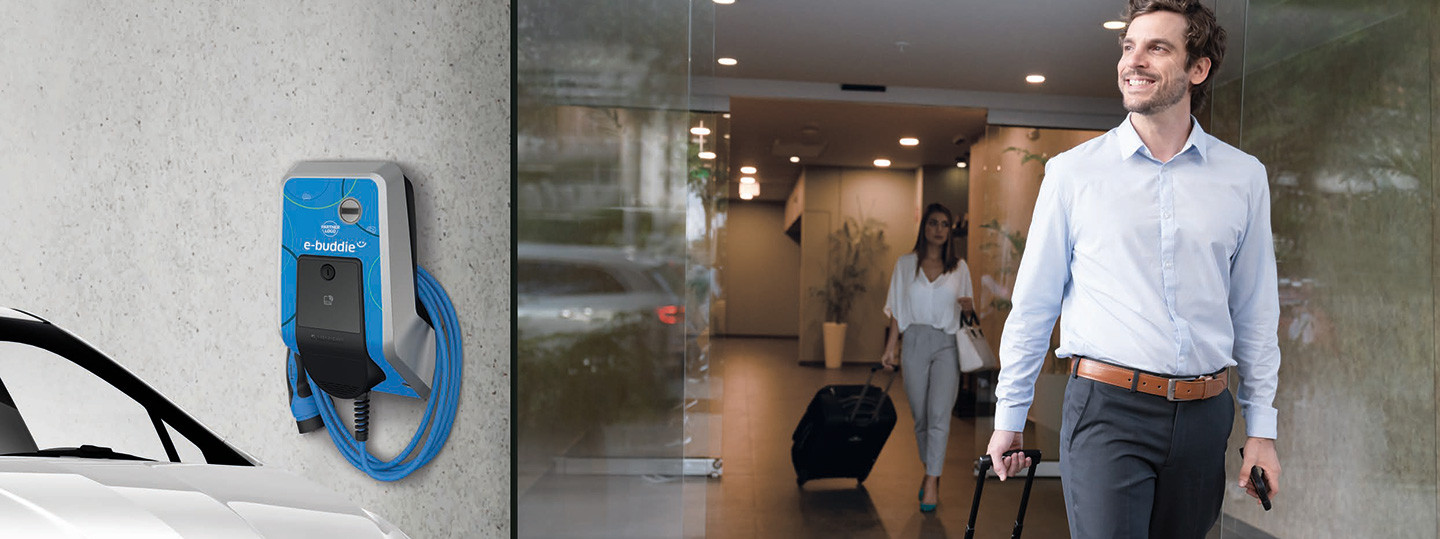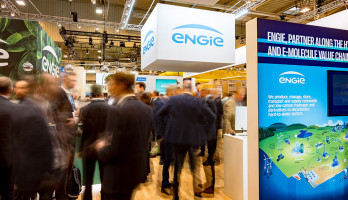
Clear the way for electromobility
Why the real estate industry must invest in charging infrastructure now
by Christian Büter, Head of Digital Solutions & E-Mobility at ENGIE Deutschland
From nice-to-have to must-have: The market for electromobility is booming, and the sales figures for electric cars are rising rapidly. For residential housing managers and project developers, this means that they must offer high-quality charging infrastructure to secure the value of their properties.
No energy transition without mobility transition! And no energy transition without electromobility. The current German government even stated this in its coalition agreement: Germany is to become the lead market for electromobility and put at least 15 million electric vehicles on the road by 2030 and have more than one million publicly accessible charging points. To this end, the German Federal Ministry of Digital Affairs and Transport presented the draft "Charging Infrastructure Master Plan II" in July 2022. This is intended to accelerate the development of a nationwide, demand-oriented and user-friendly charging infrastructure. By way of comparison, according to the German Federal Network Agency, there are currently around 65,000 publicly accessible charging points nationwide, of which a good 10,000 are fast charging points (as of August 1, 2022) - which shows how thoroughly ambitious this plan is. And it is also right and important. After all, Germany is called upon to significantly accelerate the pace of expansion of charging infrastructure in order to keep the goal of climate neutrality in sight.
No building without a charging point
On this path, residential housing managers and project developers are called upon to provide an infrastructure in private properties and neighborhoods that makes it easy for users to switch to electric cars. The Building Electric Mobility Infrastructure Act (GEIG) has been aiming to drive this process since March 2021. It states that in new residential buildings with more than five parking spaces, each of them must be equipped with line infrastructure*; in the case of renovation, the rule takes effect from ten parking spaces. In the case of non-residential buildings, every third parking space in new buildings with more than six parking spaces must be pre-equipped with a line infrastructure and a charging point. The same applies to renovations of properties with more than ten parking spaces. Important for existing buildings is the new rule, which will come into force on January 1, 2025: From that date, it will be mandatory to offer a charging point in corresponding buildings with 20 or more parking spaces. In addition, the new charging point regulation (LSV) requires that from July 1, 2023, public charging points must be equipped with a card reader and enable contactless payment via a common debit or credit card system. Last but not least, charging speed is a key criterion for a successful charging point in semi-public spaces. Here, the further development of fast charging stations can become a game changer; the electrical energy can flow significantly faster and the charging process then only takes the length of a coffee break - however, fast charging stations are difficult to retrofit.
Infrastructure secures building value
With these political commitments and technical challenges, the pressure on the real estate industry to plan and retrofit is increasing enormously. Tenants and users are pushing this further. Because in the future, the motto will be: "refuel" where you park. No operator or owner can ignore this development. In addition, project developers and owners will be required to fulfill the Environmental Social Governance (ESG) criteria of the European Union's Taxonomy Regulation. After all, sustainability reporting will soon become mandatory - and electromobility will earn plus points in ESC scoring. That is why, among other things, a high-quality charging infrastructure is essential to increase the attractiveness of buildings and ultimately to maintain or, at best, increase their value.
All-round carefree package for real estate projects
One thing is clear: this is accompanied by challenges. Managers are threatened with the loss of their business tax privilege, project developers must now plan the operating structure in buildings for the long term in order to avoid costly retrofitting and to keep self-sufficiency as high as possible. And facility managers are faced with the task of working with e-mobility IT systems, which are often highly complex. In practice, cooperation with external service providers who have the necessary expertise and the corresponding market experience has proven successful in all of the cases mentioned. ENGIE is one of Europe's leading operators:inside of charging solutions and a specialist in energy and technology. In the local market, ENGIE Deutschland offers everything from a single source with the "e-buddie" charging infrastructure concept - from planning and installation to service and maintenance. The focus is on holistic electromobility solutions without product ties for companies, businesses and neighborhoods. In addition, the team covers the interfaces to energy management and facility management optimally with comprehensive expertise and offers future-oriented energy solutions - keyword "sector coupling" in combination with photovoltaic systems, storage systems and/or heat pump technology - even with highly complex system constellations; no other service provider in Germany offers this. For example, ENGIE specialists combine electromobility with energy contracting in real estate projects. This leads to reduced operating costs, lower CO2 emissions and greater security for the client.
Electromobility is the future
All of this shows that the market for electromobility is in a state of flux - and will undoubtedly remain so. This makes it all the more important for the real estate industry to consistently address regulatory requirements and current market developments and, for example, to focus on holistic mobility concepts in construction projects and reserve network reserves at an early stage. After all, electromobility is an investment in the future. Well thought-out solutions contribute to active climate protection - and open up new scope for action for the real estate industry.
* The line infrastructure comprises the entirety of all line runs to accommodate electrical and data lines in buildings - from the parking space to the metering point of a connection user to the protection elements.
Our Expert










